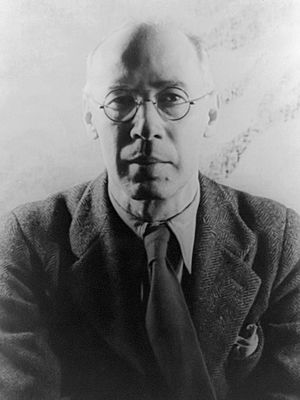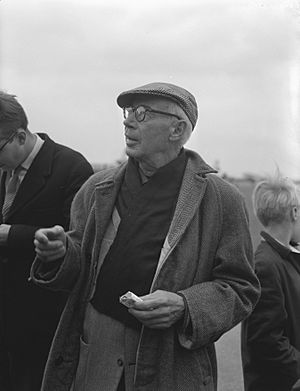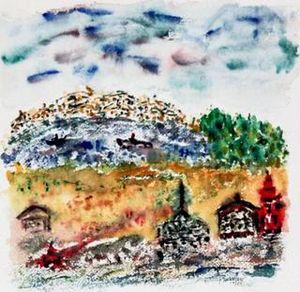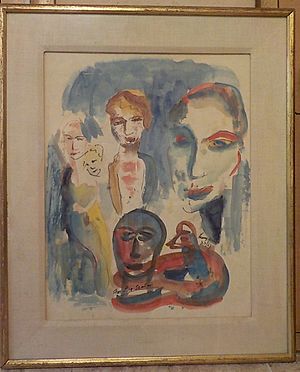Henry Miller facts for kids
Quick facts for kids
Henry Miller
|
|
|---|---|

Miller in 1940
|
|
| Born | Henry Valentine Miller December 26, 1891 New York City, U.S. |
| Died | June 7, 1980 (aged 88) Los Angeles, California U.S. |
| Occupation | Writer |
| Nationality | American |
| Period | 1934–80 |
| Genre | Roman à clef, philosophical fiction |
| Notable works | Tropic of Cancer Black Spring Tropic of Capricorn The Colossus of Maroussi The Rosy Crucifixion |
| Spouse |
Beatrice Sylvas Wickens
(m. 1917; div. 1924)June Miller
(m. 1924; div. 1934)Janina Martha Lepska
(m. 1944; div. 1952)Eve McClure
(m. 1953; div. 1960)Hiroko Tokuda
(m. 1967; div. 1977) |
| Children | 3 |
| Signature | |
Henry Valentine Miller (born December 26, 1891 – died June 7, 1980) was an American writer. He wrote many books, including novels, travel stories, and literary criticism. He was also a talented painter of watercolors.
Some of his most famous books are Tropic of Cancer, Black Spring, and Tropic of Capricorn. He also wrote a series of three books called The Rosy Crucifixion.
Contents
Early Life and Education
Henry Miller was born in New York City. His family lived in the Yorkville area of Manhattan. His parents, Louise Marie and Heinrich Miller, were of German background. His father was a tailor.
As a child, Henry lived in Williamsburg, Brooklyn for nine years. He often wrote about this area in his books. Later, his family moved to the Bushwick section of Brooklyn.
After elementary school, Miller went to Eastern District High School. He was interested in politics when he was young. He was active with the Socialist Party of America. He also attended the City College of New York for one semester.
Miller's Writing Career
Starting in Brooklyn (1917–1930)
Henry Miller wrote his first novel, Clipped Wings, in 1922. He wrote it during a three-week vacation. This book was never published, but he used parts of it in other works.
In 1924, Miller decided to focus completely on writing. He quit his job at Western Union. His second novel, Moloch: or, This Gentile World, was written between 1927 and 1928. This book was not published until 1992, after his death. Another novel from this time, Crazy Cock, also remained unpublished until later.
Years in Paris (1930–1939)
In 1930, Miller moved to Paris, France. He soon started working on Tropic of Cancer. He didn't have much money at first.
Things changed when he met Anaïs Nin. She and Hugh Parker Guiler helped him financially. Anaïs Nin also helped publish Tropic of Cancer in 1934.
In 1931, Miller got a job as a proofreader for the Paris edition of the Chicago Tribune. His friend Alfred Perles helped him get this job. Miller sometimes submitted his own articles using Perlès' name. This was because only staff writers could publish in the paper.
His time in Paris was very creative. He met many other writers and artists. One of them was the British author Lawrence Durrell, who became a lifelong friend. Miller was also influenced by French Surrealism during this period. He learned to speak French fluently. He lived in France for ten years, until 1939.
Life in California (1942–1980)
Miller returned to the United States in 1940. In 1942, he moved to California. There, he began writing Sexus. This was the first book in The Rosy Crucifixion series. This series tells a story based on his life in Brooklyn. It covers his experiences falling in love and trying to become a writer.
Like some of his other books, this series was first published in France and Japan. It was not available in the United States at first.
From 1944 to 1947, Miller lived in a small house on Partington Ridge. He lived there with other writers. During this time, he wrote "Into the Nightlife".
In his California writings, Miller often shared his thoughts on American society. He wrote about his concerns with how much people bought things. This can be seen in books like Sunday After the War (1944) and The Air-Conditioned Nightmare (1945). His book Big Sur and the Oranges of Hieronymus Bosch (1957) is a collection of stories. It is about his life and friends in Big Sur.
Personal Life and Final Years
Henry Miller was married five times during his life. His last wife was a Japanese singer named Hoki Tokuda. They divorced in 1977.
In 1963, Miller moved to Pacific Palisades, Los Angeles. He lived there for the last 17 years of his life. He passed away on June 7, 1980, at the age of 88. He died from health problems at his home.
Miller's Watercolors
Besides his writing, Henry Miller was also a talented artist. He created many watercolor paintings. He even wrote books about painting. He was good friends with the French painter Grégoire Michonze.
It is thought that Miller painted around 2,000 watercolors in his lifetime. Many large collections of his paintings exist today. The Harry Ransom Center in Texas has some of his watercolors. There was also a Henry Miller Museum of Art in Japan, which closed in 2001. Miller's daughter, Valentine, sold some of his art in 2005. He also enjoyed playing the piano.
See also
 In Spanish: Henry Miller para niños
In Spanish: Henry Miller para niños
 | Tommie Smith |
 | Simone Manuel |
 | Shani Davis |
 | Simone Biles |
 | Alice Coachman |




